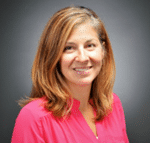Volume 38 Number 3 | June 2024
Katrina (Kate) Moreau, MPH, MAT, MLS(ASC)CM, ASCLS Patient Safety Committee Vice Chair
Georgia Vega, MBA, MLS(ASCP)CM, ASCLS Patient Safety Committee Chair

Advancements in technology have improved result timeliness and accuracy, and ultimately, played a role in patient and employee safety. Gone are the days of mouth pipetting (thank goodness!) and routine manual differentials. Instead, robotic arms may now handle pipetting aliquots, and automatic slide makers and digital slide reading, powered by artificial intelligence, have revolutionized the analysis of blood cells. Even initial tests for monitoring blood glucose levels have evolved into continuous glucose monitoring systems, offering weeks of data without the need for an invasive fingerstick.
As laboratories are constantly adapting, leveraging innovations to enhance efficiency, decrease costs, and increase testing volumes, the question arises: How do we prepare our students and employees for what lies ahead? To address this, we need a multifaceted approach encompassing skill development, continuous education, and adaptability, which begins at the programmatic level and continues through an individual’s professional career.
In addition to ensuring the development of critical thinking and problem-solving abilities and providing a solid base of knowledge, we must figure out how to create more space in our curricula for incorporating advanced laboratory techniques, introducing emerging technologies, offering training in data science and informatics, and putting greater emphasis on quality management and regulatory compliance.
Listed below are areas of opportunity to better align curriculum to current practices.
- Advanced Laboratory Techniques – Many of the manual methods learned in student labs are no longer used in practice. Hands-on training and knowledge of advanced techniques is essential for performing complex diagnostic testing.
- Emerging Technologies – Incorporating the application of artificial intelligence, role of disruptive innovations, and trends in point-of-care testing into the curriculum fosters curiosity, adaptability, and new ideas.
- Data Science and Informatics – A required introduction to the skills necessary to analyze large data sets, interpret the data, and leverage technology is valuable in many ways, from professional growth to improving population health outcomes.
- Quality Management and Regulatory Compliance – More time teaching the importance of quality management, regulatory standards, and federal policy could mitigate becoming too dependent on technology and complacent, which may inadvertently cause quality to suffer.
- Emotional Quotient/Emotional Intelligence – Equally important are the soft skills (e.g., communication, collaboration, and respect) and core competencies (self-awareness, self-management, social awareness, and relational management) that underpin effective teamwork and patient-centered care.
As the laboratory evolves and new testing emerges, we must focus on workforce development and evolving our programs to bridge the gap and meet the demands of the modern clinical laboratory.
Katrina (Kate) Moreau is a Clinical Associate Professor at the University of Vermont and is the Program Director for Medical Laboratory Sciences. She also serves as the CLIA Director for an FQHC in Burlington, Vermont.
Georgia Vega serves on the Advisory Board for Customer Experience at Our Lady of the Lake University in Houston, Texas.
